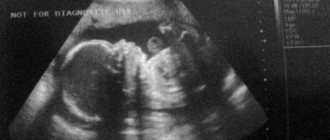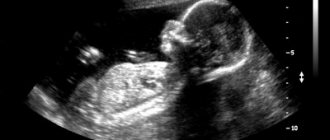How wonderful the pregnancy period is for the expectant mother: the anticipation and anticipation of meeting her dearest person. Pregnant women think about what their baby is like: facial features, gender, whether he looks like mom or dad, but they don’t always think about the fact that the child can feel and experience something while in the mother’s womb. A variety of sensations opens up for babies quite early. There are many different ways to explore these points.
Sweet food
Children begin to distinguish different tastes already at 13-15 weeks of pregnancy. Your amniotic fluid tastes like the food you eat. Children get it and get used to different tastes.
Food preferences are established in the womb. If you want to ensure that your baby will be a good eater in the future, eat a variety of healthy foods during pregnancy. And know that babies especially like the sweet taste because it predisposes them to breast milk.
Stroke the expectant mother's belly more often
By the THIRD month of intrauterine development, the unborn child has developed all the systems necessary for life support after birth. For the remaining six months, these systems mature and learn to work together under the guidance of the main computer that controls a person’s life—his brain.
Every new life is unique
JUST recently we were sure that in the womb a child develops only physically, and its spiritual and psychological formation begins only after birth. Meanwhile, over the past 25 years, a lot of scientific data has appeared indicating that from the moment of conception, the biological (physical) and psycho-emotional development of a person proceeds in parallel.
Every person is unique from the moment of conception. It is believed that genetic memory records not only biological, but also spiritual and psychological events of previous generations. In addition, the parents who give birth to a new person are unique in their own health and level of intelligence. Along with this, during conception, only one out of a million sperm and only one out of thousands of eggs, unique in their structure, united. This happened in a certain place on the Earth, with the already unique position of the Moon and planets, the state of the electromagnetic field, solar activity and many other factors that in such a combination will never happen again. That is why we must have sufficient respect for any developing life, for the abilities and possibilities of each person.
Until recently, doctors lived with the knowledge that the fetus is deaf and dumb, that it does not see or feel anything, has neither memory nor thinking. We lived with the idea that the uterus is a closed space where neither light nor sound penetrates, and the placenta is a powerful barrier that does not allow harmful substances (alcohol, drugs, nicotine, coffee, medications) to pass through. Taking everything into account, we could allow ourselves to behave as we wanted, without taking into account the fact that the unborn child might feel something, worry that his character was already being formed. At the same time, today new research methods have allowed scientists to look into the uterine cavity, “visit” an unborn child, photograph it, film it, and observe a person’s life before birth for a long time.
Currently, neurologists and psychologists have come to the conclusion that a person’s character is actually formed in utero, and only adjustments occur after birth. At the same time, parents often do not notice that the child is showing them their own traits. Therefore, if you want your child to be kind, to love you, and to strive for knowledge, you need to demonstrate these qualities yourself during pregnancy and after birth.
As the due date approaches, women experience increased anxiety, which can lead to disruption of the normal development of labor, which requires the use of various medications or surgical delivery. In addition, the fear experienced by the mother during pregnancy is picked up by the child, and, as studies by foreign psychoanalysts have shown, remains in the person’s memory for many years, manifesting itself in the form of various deviations in his physical and mental health.
The role of the father during the intrauterine development of the child is also very important. Firstly, he gave the child genetic material and in fact laid down, equally as the mother, his future possibilities. Secondly, the father shows his attitude towards the child through his attitude towards the mother, through his love for her. It is necessary, however, to keep in mind that he must be sincere. After all, in addition to the verbal channel for transmitting information - words, there is also a look, intonation, touch, which cannot be faked.
Formation of the child’s physical health
ONE of the most important points in the formation of physical health is the timely correction of the child’s posture. From ancient times the idea came to us that “our health is in our spine.” Violation of the formation of the spine is the cause of a huge number of functional disorders and dystrophic lesions of various organs, pain syndrome, and asthenia.
The age of 6-7 years is a critical period in a child’s life, when most physiological functions complete their development.
The second important (also “critical”) period in a child’s life is the period of puberty, the formation of the sexual constitution. The imposition of the formative effects of sex hormones on the original somatic constitution causes temporary desynchronization and disharmony in the functioning of organs and systems.
The problem of nutrition deserves special attention. With the help of nutrition, you can influence the formation of the constitution and manage physical and mental health. These opportunities are associated primarily with the informational effects of food ingredients and their energy value. Information influences mean guides that model the metabolism of the influence of biologically active substances, vitamins, and microelements. At an early age, for example, the role of iodine, iron, and calcium is especially important. Girls who are delayed in sexual development require more copper.
Mom is the child's first universe
NOW it is no secret to anyone that the child leads an active life in the mother’s belly: he moves, sucks his finger, turns his head towards the source of sounds that are interesting to him, and “plays” with the umbilical cord. Everything a mother does is passed on to the child in one way or another. After all, the mother is the child’s first universe, his “living raw material base” from both a material and psychological point of view. An example is the fact that the taste of amniotic fluid changes depending on what the mother has eaten. Many fetal reactions are related to the mother's condition. The child makes convulsive movements when the mother is worried, makes a grimace of displeasure when the mother is administered medications. The child experiences all the conditions of the mother at the hormonal level. For a baby, the information that comes from the mother is very important. This is a necessary condition for brain development. It should be noted that versions are now being put forward that it is during the prenatal period that basic trust or distrust in the world begins to form; this is based on information received by the child from the mother.
Psychoanalyst Dr. Silvio Fangi, in his book Micropsychoanalysis, expresses the opinion that the sources of all a person’s problems arise long before his birth. He called the relationship between mother and child during pregnancy “intrauterine war,” which ends after the birth of the child and can resume with renewed vigor if the mother offends her child.
Man is a paradoxical creature
The INTEGRATIVE psychological model of pregnancy structurally includes a critical and two stable periods: each has its own development mechanism and its own principles of activity for the mother or prenatal practitioner (obstetrician, psychologist, teacher):
— crisis of otherness
(fertilization-conception). The mechanism of development is the metaphorical separation of the fertilized cell from the mother’s body;
— stage of embryo acceptance of compatibility
(fetus). The developmental mechanism is identification with the mother’s body, psychologically manifests itself as the occupation of the mother’s body and consciousness and manifests itself in the first trimester of pregnancy. For this period, a model of unlimited communication, “isolation” of maternal experience through response and awareness is adequate;
— fetality crisis
The mechanism of development is again the separation of the fetus through movement, which makes it visible and accessible to direct contact. The psychological significance of this crisis is that the mother gets the opportunity to give meaning to movements, respond to them, cause them, practically giving human meaning to the activities of the fetus. At this stage, learning and targeted development of the sensory abilities of the intrauterine child are possible;
— development stage
(intrauterine baby). The mechanism of development is identification, the maximum approach of the fetal body to the walls of the uterus, assimilation of its body to the boundaries of space. The psychological meaning of this stage is to establish the regularity of movements and their correspondence to maternal messages, establishing dialogue;
— intrauterine infancy crisis
, or generic, refers to the next stage, the stage of revival.
Crisis of otherness. The psychological meaning of this period is in the confrontation between the child and the mother (parents), he belongs to an “other”, incorporeal world, and they offer him a bodily way of being. He destroys the mother's body, literally eats it. When you're being eaten, the natural reaction is to stay away from your teeth. Natural, but not human. The human reaction is paradoxical. In order for prenatal community to find its foundation, parents must behave in the opposite way, namely, sincerely desire all these troubles. Call a child, invite him, go towards destruction, accept him. If, despite conscious efforts to conceive a child, he remains in otherness, it is necessary to pay increased attention to your own unconscious life.
The stage of acceptance of togetherness is “fruit”. At this stage, when the soul and body agree to accept the child, he receives freedom to be and strives to merge, identify, occupy the body and consciousness of the mother. He liked it in his stomach, he accepted the rules of the game “meet halfway.” It is this “natural” state that is described in pregnancy psychiatry books and women’s magazines. The motto of this period (from about 3 weeks to 22): “I'm so lonely!” This is a time of melancholy, depression, whims, naivety, touchiness, demands on others, infantility, and childishness. In general, the state and behavior of a woman during this period represent, to one degree or another, a satisfied desire to occupy someone’s life and consciousness. She wants to take over everything, but she can’t and therefore feels lonely and abandoned. If everything is left like this until the end, then the result will be just a symbiosis, malignant and destructive. Pregnancy will pass as naturally as a growling stomach, and the baby will not be able to feel separate. And the mother will be disappointed when he is born. She must be ready to deal with the baby, and not with her own states of mind and body. We must accept loneliness not as weakness, but as an opportunity to act separately, independently, and not under orders, as an opportunity for freedom. If the husband and family satisfy the infantile desires of the pregnant woman and are occupied only with her, as if she were a child and they were pregnant with her, the expectant mother should all the more do the spiritual work of separating herself from the “fetal” state, at least not get carried away by the special position and take take on “adult” responsibility, as before.
Crisis of fetal life. So, after the family has united with the child and placed itself in a parental relationship with him, the prenatal community is built. The conditions for self-existence have arisen. He begins to act on his own, the strictly human period begins, the period of independence. When the expectant mother feels the baby moving, she may say “he’s moving” rather than “I feel sick.” An “other” appears in her mind. Again there is confrontation, he does not obey his mother, he is autonomous... The motto of this period: “I can’t cope!”
The last stage of the stage of incarnation is called the “fetal baby.” This is already a person responding to another person, dealing with human reality, but so far in a distorted form. He is adapted to life on this side. An interesting fact is that at this stage the vast majority of women behave and feel not “naturally”, but “normally”, that is, they think about childbirth and buy a dowry. That’s right, at this stage you need to be in the future, you need to literally “see” your child after birth and your relationship with him.
Life begins not at birth, but at conception
TODAY, all over the world, including Russia, the principles and methods of prenatal education are being revived at a modern level, often supplemented by religious views. However, the role of medicine in many centers created for prenatal education is still very limited.
Modern routine care of pregnant women and women in labor, of course, includes care for the fetus, but in the vast majority of cases - about its vegetative, rather than emotional, state.
The tragedy with thalidomide, a seemingly harmless sleeping pill, led to the birth of many freaks who were born without limbs. And in 1995, a study was conducted in Copenhagen of adults born to mothers who received barbiturates as a sleeping pill during pregnancy. The results were impressive: the IQ and other criteria of mental abilities of the people examined were 7-12% worse than those of people of the same age, education and social status.
American psychologists believe that “life begins not at birth, but at conception.” Consequently, what a person experiences from conception onwards will have a significant impact on his physical and psychological development. Research in pre- and postnatal psychology has shown that music has a tremendous stimulating effect on the cognitive, emotional and psychomotor development of both the unborn and newborn child. If a pregnant woman listens with pleasure to gentle, affectionate music, then this affects the fetus in some way (not yet entirely clear to psychologists), and after birth, children react more actively to the music that they already “heard” before birth.
Today, there are many different programs for the education of the unborn child, which, according to the inventors, make it possible to give birth to “emotionally balanced children” with a high level of intellectual development quotient. These children are more active, they smile, sit up, walk and talk earlier, and they have deeper bonds of love with their parents. Whatever life circumstances, domestic squabbles, conflicts and relationships, lack of money, difficulties with food - whatever our difficult life, still, expectant mothers, carve out at least a few minutes every day to think about the eternal, about kindness , listen to beautiful music, give yourself a little pleasure - every joyful and kind minute will intensify many times over and become part of the being of your unborn child.
Talk to him, send him your warmth, your tenderness. Every day, for at least five minutes, imagine your child, talk to him, concentrate your thoughts and all your love on him. This secret dialogue actually goes on all the time - an exchange of feelings and sensations. It’s just that, due to our inability to concentrate, we cannot feel it properly. But if the expectant mother, daily focusing on thoughts about her child, listens to him, mentally penetrates into his secret life, concentrates all her attention on him, talks to him, conveys her warmth and affection to him, then she creates the deepest relationship with her future child, establishing a perinatal bond of love with him.
Hello baby, I'm your daddy
SONDRA Rae, in The Perfect Birth, advises: “Touch your belly and say, ‘Baby, listen very carefully. I, your mother, tell you: “Walk the path of beauty, divinity and truth in your life. I want you to be great physically, emotionally, intellectually and spiritually. You should always try to be kind, loving, helpful to people, be brave and fearless. Don't let other people treat you wrong. No matter what happens in your life, you will always be joyful. You will be bold and fearless in your work to create a new world.”
You can come up with other words, but try to find a quiet moment of focus every day and talk to your future child. Then after birth your emotional contact will bring you deep satisfaction and joy.
This applies equally to the future father. If the husband wants the child not to cry when he hears an unfamiliar voice after birth, put his hand on his wife’s stomach every day and say: “Hi baby, I’m your daddy, I’m waiting for you with joy, we’ll be friends,” or something something like this. Researchers about newborns turned their heads towards the male voice, already familiar to them, and did not cry, but smiled. Dear dads, if you want to be loved by your children, learn to express this love for your future children through love for your pregnant wife. It has been proven that the more the expectant mother makes various meetings, walks, and visits, the better (and negative emotions are also necessary). Even in the prenatal state, the child learns to determine the mother’s reaction to positive and stressful factors and often adopts her behavior later. Neurologists say that a sharp increase in heart rate (up to 130-140 beats per minute) in some conflict situation is short-lived, that is, if a woman quickly copes with her emotions, then the child after birth will most likely be emotionally stable.
A mother who avoided stress in every possible way during pregnancy may do her child a disservice - the child simply will not be able to withstand stress. During a period of emotional release, it is best to put your hand on the stomach, stroke it, and talk to the child. After all, already at 4 months he is able to perceive all the mother’s feelings, so the more interesting and eventful her life is, the better the brain and nervous system of the fetus develop. Logical thinking and the ability to speak languages, according to American researchers, are formed from the 4th month of pregnancy until the beginning of the third year of life. Therefore, the more words in different languages he hears during this period, the easier the baby will be able to master the wisdom of foreign speech in the future.
Susceptibility to noise in the prenatal state is quite high. On the one hand, with sharp, loud sounds, the fetus experiences not only fear, but also a deterioration in its condition: it feels pain, the pulse increases sharply, it seems to shrink (this can explain miscarriages and premature births that followed excessively noisy showdowns). On the other hand, gentle melodic music has a beneficial effect on the fetus: the baby “dances” to it, and then, as numerous experiments have shown, he retains the ability to recognize the melody he likes.
An outstanding prenatal psychologist, Doctor of Medical Sciences Thomas Verney showed that already four months after conception the child hears well, reacts to sound, and recognizes a melody. Turn on Vivaldi, and even the most restless child will relax. Turn on Beethoven, and even the calmest will begin to toss and turn and kick his legs. Audiologist Michelle Clemente, as a result of her research, came to the conclusion that a child before birth has his own favorite and unfavorite music. Some of the favorite composers of unborn children are Vivaldi and Mozart. But the music of Brahms, Beethoven and all types of rock music, on the contrary, makes them excited. Perhaps if you let your unborn child listen to music, he will develop a deep interest in it for life.
Indulging your child in everything is more expensive for yourself
NEVER are two people so intimately connected to each other as mother and child. Motherhood is the most important calling that nature has determined for a woman. The greatest works of art created by man depict a mother and her child.
The child sometimes demands the presence of the mother more often than circumstances require, which, of course, adults do not like. But here we must always remember that we are talking about a protective mechanism that was once vital in phylogenesis. Civilization has changed the situation over time, but the question of the need for the mother’s presence remains unknown to the child. Lying in bed, he has the same attitude towards his mother as when he is in her body. Therefore, he is forced to constantly ask to be held by his mother, since he feels best with her. Typically, a child falls asleep better in his mother's arms or lying next to her.
However, at present it is not recommended to accustom a child to his parents' bed.
Too strong maternal love, in which they try to fulfill any desire of the child, turns into weakness. Many children then have difficulty getting used to a different way of life and try with all their might to resist it. It is possible, of course, to overcome this resistance, but many mothers are unable to achieve this, although they are well aware of the wrongness of their behavior. The older a child gets, the more difficult it becomes to fulfill all his wishes, since it is necessary to take into account the interests of other people. The school, which accustoms the child to the team, has a particularly good influence. Comrades are usually not inclined to take him into account, as his mother does.
Exaggeration of care for a child often causes distrust of the doctor. If the result of treatment is not immediately noticeable, mothers turn to a second, third doctor, etc. In general, the more care there is for the child, the faster doctors change. However, changing doctors does not benefit the child. In addition, it can be difficult to persuade such a mother to place her sick child in a medical institution, although this is sometimes the only chance of saving him. It seems to her that her child is something special and will definitely die among strangers from homesickness. If you still manage to persuade the mother to place the child in the hospital, she appears again in the evening or the next day to pick him up, because she finds no peace at home due to worry about him. Sometimes such a child is taken out of the hospital prematurely.
It is also indicative how the children of such mothers behave in the hospital. They easily and without difficulty obey the general order, although they, like other children, experience homesickness in the first days. But as soon as the mother appears, the picture immediately changes. A previously friendly child becomes capricious and restless. If before his mother’s arrival he eats well from his sister’s hands, now, when his mother wants to feed him, he does not take food from either her or his sister in her presence. Now he refuses every spoon. But the more the child resists, the more excited the mother becomes, who in her imagination already sees a child dying in the hospital from hunger. It very rarely happens that a mother does not love her child. Even in the case of an illegitimate birth, when the presence of a child makes her existence extremely difficult, maternal love remains and even sometimes intensifies.
When caring for a child, especially young and inexperienced mothers often succumb to the influence of others. Friends and relatives willingly give advice that they take for granted. Sometimes even strangers on the street start talking to mothers about her child. Sympathy is expressed, for example, by the following words: “How bad your child looks.” The mother, feeling reproach in this expression, goes to the doctor. The doctor then faces the difficult task of calming her down and proving that her worries are unfounded.
Nothing even approximately similar almost never happens between a father and his offspring. Feelings of paternity are phylogenetically later acquisitions of a person, therefore the father is less attached to his children than the mother.
The desire to have a boy is the reason for the birth of girls
The FATHER, whose surname the family bears, wishes for the most part to have male offspring, a bearer of the surname and an heir. The mother, on the contrary, who recently changed her last name, does not take this issue so seriously. However, the gender of the newborn does not depend on the wishes of the parents, so a person’s disappointment can be great when hopes are not met again. It even happens that the father does not want to see his newborn daughter, although this hostility soon passes. In addition, you should know that the gender of the child depends on the father, not the mother. The guilt, if we can talk about any guilt at all, therefore lies with the father. This biological dependence, however, is mostly unknown to parents. In any case, parents are not prohibited from making new attempts.
Thus, the desire to give birth to a boy is the reason for the birth of many girls. As much as women show a keen interest in babies, young men usually show little interest in them. In the room with the newborn, the father initially feels out of place and awkward. He doesn't know the most basic techniques for caring for a baby, so he has to be taught. Some fathers in this case overestimate their knowledge. Unfortunately, the father's care for the child is often expressed in reproaches to the mother. If a child coughs, it means she didn’t look after him well and didn’t protect him; if she cries at night, she’s raising him wrong. And when the child needs to be punished, the father begins to object.
The father, who has been at work all day, comes home and has a completely legitimate desire to play a little with the child. If this happens very late, a sensible mother will understand and organize the child's daily routine accordingly. Of course, after a hard and difficult day, a father wants to see cheerful faces at home, and not listen to reports of pranks that happened during the day and act as a punitive judge. Because of this, conflicts easily arise between parents.
The fact that a mother spends all her time with her children has its advantages and disadvantages. Children always prefer their mother to their father, and some fathers are offended by such neglect. Although children love their mother more, she has more difficulty communicating with them when they are disobedient. She suffers much more than the father from the child’s disobedience. If the father is weak and pliable, then he allows what the mother prohibits, and then the mother’s authority in the eyes of the children falls. Children do best under the strong and confident guidance of both parents, although many of their wishes are not fulfilled. Quarrels between parents that occur in front of their children are always a difficult experience for them, and these memories remain with them for the rest of their lives.
The growth of the fetus is proceeding at a gigantic pace. At the 12th week, the fetus reaches only 9 cm in length, at the 20th - 20 cm, at the 28th - 35 cm. At the 40th week, from crown to toe, its height is on average 50 cm.
Studies have shown that by the fifth week, the embryo can move its arms and torso, expressing its pleasures and displeasures with nods and grimaces. By the fourth month, he develops facial expressions: he can smile and frown. After a few more weeks, he already reacts to any touch: this is why it is so important for the mother and loved ones to stroke the belly so that the child perceives the affection. From 6 weeks, the fetus develops sensitivity to light: it is disturbed by light directed directly at the mother’s belly. Neurological studies have confirmed that between the 28th and 30th weeks, the baby develops pathways that transmit signals from the brain to various parts of the body. At the same time, the cerebral cortex becomes quite mature.
It is precisely because the child inside the mother not only develops physically, but is already a feeling and emotionally responsive being, that the emotional climate in the family is so important, the main goal of which is peace, goodwill, patience and joyful anticipation of a new person. A woman who talks to her unborn child, reads poetry to him, listens to her favorite music, is constantly tuned in to the same emotional wavelength as her baby. She always remembers that mother and child are one interdependent unit, and this will provide the child with an emotionally sound start in life.
In the first months of pregnancy, sometimes for no apparent reason a woman wants to cry or laugh.
These emotional changes in a pregnant woman, associated with hormonal changes, should be known and taken into account by those close to her; they should try to be affectionate, gentle with her, not pay attention to her whims, and console her if she unexpectedly bursts into tears. And the expectant mother herself must learn to switch: remember a funny incident or anecdote, listen to cheerful music, go for a walk, take a warm bath. She needs to know that these emotional outbursts are short-lived and that she can learn to control herself until they pass. When a newlywed couple in the middle of their honeymoon asked the sage when they should start raising their unborn child, he replied: “You are two weeks late.”
Using warm baths
When babies are big enough to nestle inside their mother's belly, they can feel changes in temperature. This is why a hot bath is uncomfortable for them and can be dangerous. A nice warm bath, on the other hand, is beneficial: it gives you and your baby some rest and relaxation.
Strange color. A man adopted a cat, not knowing that he had found a rare pet.
Chinese youth make wills very early to appreciate and understand life
New Year's gifts decorated in vintage style: 10 ideas for loved ones
The sound of flowing water also helps the baby feel good. To make it even more enjoyable, pour water on your belly and try to feel your baby's reaction.
What does a baby experience during childbirth?
Modern scientists are increasingly exploring the relationship between mother and child. How does the baby feel during childbirth? Experts studying this area have conducted many experiments: they put people into a state of deep hypnosis so that they could look into the past on an unconscious level. In this way, a person remembered how he was born. Then these facts were compared with the mother’s stories - the matches turned out to be one hundred percent. Perinatal psychologists claim that all memories, including those of childbirth, remain in our memory.
So what are these people saying? When a child passes through the birth canal, he feels suffering, fear and horror. This is a huge experience for the entire human life. This is explained by the fact that our life is filled with difficult obstacles, we experience pain and sorrow, and experience troubles. Thus, our experience of passing through the birth canal is transferred to complex adult life. When a child is born, he experiences enormous shocks:
- bright light
- temperature difference
- touching the skin
- change in smells
- transformation of sounds
But the most terrible and unpleasant thing that people talked about from the experiment was the horror of the first breath. When a person takes his first breath, the lungs open - this is a very painful process. The subjects felt themselves at this time between life and death. Imagine how a child feels when he is born!
Listen to your mother's voice
At 25-26 weeks, babies begin to respond to sounds they hear outside the womb. And because your voice is heard more clearly than anyone else's, your baby learns to recognize it. This creates comfort and safety for them and signals that everything is okay. An effective way to develop relationships and delight your child with your voice is to read aloud or simply talk.
Other relatives' voices are also a pleasure. Especially the father's voice, because it is easier for children to distinguish lower tones. All the other sounds around the belly prepare babies to understand the combination of intonation and sound in their native language.
Lamp and pumpkin donuts: Yulia Savicheva spoke about New Year's gifts
A festive figure of a Christmas angel appeared on Mars
SuperJob: since the release of Vector V, the number of people wanting to get vaccinated has increased
Regular exercise
The key to choosing the right exercise during pregnancy is that it should be safe, appropriate and approved by your doctor.
Cardio exercises are the best activity during this time. A young child's heart develops better and becomes stronger when his mother exercises regularly.
Cardio also slows down a pregnant woman's heart rate, which is a positive because a higher heart rate makes the fetus more restless.
Mom's laughter
An ultrasound showed that the fetus moves up and down when the mother laughs. The trampoline reaction occurs in sequence - the mother laughs even harder, and the child moves even more. This is due to muscle contraction.
Happy hormones, which relax you when you feel great and enjoy the present moment, contribute to the emergence of pleasure in the baby in the womb. Make sure you experience the most positive moments during pregnancy.
Pregnancy is a time when you need to experience only positive emotions and make the most of them. The better you feel, the healthier and happier your baby will be. So give him most of the above pleasures to bring the world a happy little man full of energy and strength.
Found a violation? Report content
Emotional connection between child and mother
Experts, studying the world of babies, came to amazing discoveries that gave impetus to the knowledge of perinatal psychology, as a science about the mental and pedagogical development of children in utero. Scientists' research shows how the baby reacts to the mother's emotions and mood, as well as the environment around her.
The child copies the activities and behavior of the mother. If the woman sleeps, the child also falls asleep and calms down. If the expectant mother is engaged in active actions, then the baby makes itself known with energetic movements. The baby especially feels the emotions and state of its parent. Negative experiences, thoughts, joyful moments - the baby projects all this onto himself. The exchange of worldviews is explained by the fact that hormones are generated that are formed in the body during a woman’s emotions and the flow of these hormones is transmitted to the baby through the umbilical cord. Therefore, the child feels everything the same as his mother.
Does the baby feel touch and pain in the mother’s stomach?
The baby's nervous system develops very early. By the 7th week, the baby has developed skin sensitivity and a reaction to irritants, that is, he is able to feel pain. Touching a child's body provokes him to respond. From 15 weeks, a baby can feel touching his mother’s belly. A little time will pass and he will learn to respond to such a gesture with pushes.
Does the baby taste food in the mother's belly?
The baby has a developed sense of touch. If the mother eats sweetish food, then the amniotic fluid is saturated with a sweet taste and the child likes it - he happily swallows the water that is tasty for him. And vice versa, when the mother eats spicy, salty food, the baby grimaces from the unpleasant taste.
Can the baby see in the womb?
The reaction to light appears in children by 6 - 7 months. The child does not like it when this irritating factor is directed at him - he instinctively turns away and tries to run away.
How does a baby in the stomach react to mom's smoking?
The baby reacts sharply to his mother’s idea of smoking. This causes his heart to beat rapidly, causing anxiety: when a woman smokes, her blood vessels narrow, through which the child stops receiving sufficient oxygen.
Does a child hear in the womb: voice and music
It is very interesting that by 5-6 months the child hears sounds and reacts to them. Thanks to this discovery, perinatal psychologists conduct trainings with expectant mothers about the importance of raising unborn children. There are experiments on the effect of sounds on babies. For example, with increased volume, the baby’s heart begins to beat faster.
The most amazing thing is that the baby can remember sounds and after birth respond to them in the same way as in utero. For example, if calm music or a mother’s own lullaby puts an unborn baby to sleep, then after birth the impact of these factors may be the same. Accordingly, the baby remembers the voices of his relatives who surround his mother all the time. If dad, brother or sister communicate with the “tummy,” then the baby can remember the voice and phrases. After birth, he recognizes them when he hears them.











